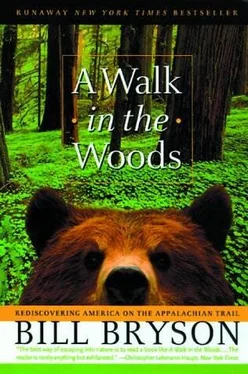Bill Bryson - A Walk In The Woods
Здесь есть возможность читать онлайн «Bill Bryson - A Walk In The Woods» весь текст электронной книги совершенно бесплатно (целиком полную версию без сокращений). В некоторых случаях можно слушать аудио, скачать через торрент в формате fb2 и присутствует краткое содержание. Жанр: Современная проза, на английском языке. Описание произведения, (предисловие) а так же отзывы посетителей доступны на портале библиотеки ЛибКат.
- Название:A Walk In The Woods
- Автор:
- Жанр:
- Год:неизвестен
- ISBN:нет данных
- Рейтинг книги:4 / 5. Голосов: 1
-
Избранное:Добавить в избранное
- Отзывы:
-
Ваша оценка:
- 80
- 1
- 2
- 3
- 4
- 5
A Walk In The Woods: краткое содержание, описание и аннотация
Предлагаем к чтению аннотацию, описание, краткое содержание или предисловие (зависит от того, что написал сам автор книги «A Walk In The Woods»). Если вы не нашли необходимую информацию о книге — напишите в комментариях, мы постараемся отыскать её.
A Walk In The Woods — читать онлайн бесплатно полную книгу (весь текст) целиком
Ниже представлен текст книги, разбитый по страницам. Система сохранения места последней прочитанной страницы, позволяет с удобством читать онлайн бесплатно книгу «A Walk In The Woods», без необходимости каждый раз заново искать на чём Вы остановились. Поставьте закладку, и сможете в любой момент перейти на страницу, на которой закончили чтение.
Интервал:
Закладка:
Amazingly, given the moose’s lack of cunning and peculiarly blunted survival instincts, it is one of the longest-surviving creatures in North America. Mastodons, saber-toothed tigers, wolves, caribou, wild horses, and even camels all once thrived in eastern North America alongside the moose but gradually stumbled into extinction, while the moose just plodded on. It hasn’t always been so. At the turn of this century, it was estimated that there were no more than a dozen moose in New Hampshire and probably none at all in Vermont. Today New Hampshire has an estimated 5,000 moose, Vermont 1,000, and Maine anywhere up to 30,000. It is because of these robust and growing numbers that hunting has been reintroduced as a way of keeping them from getting out of hand. There are, however, two problems with this that I can think of. First, the numbers are really just guesses. Moose clearly don’t line up for censuses. Some naturalists think the population may have been overstated by as much as 20 percent, which means that the moose aren’t being so much culled as slaughtered. No less pertinent is that there is just something deeply and unquestionably wrong about killing an animal that is so sweetly and dopily unassuming as a moose. I could have slain this one with a slingshot, with a rock or stick-with a folded newspaper, I’d almost bet-and all it wanted was a drink of water. You might as well hunt cows.
Stealthily, so as not to alarm it, I crept off to get Katz. When we returned, the moose had advanced to the water and was drinking about twenty-five feet upstream. “Wow,” Katz breathed. He was thrilled, too, I was pleased to note. The moose looked up at us, decided we meant her no harm, and went back to drinking. We watched her for perhaps five minutes, but the mosquitoes were chewing us up, so we withdrew and returned to our camp feeling considerably elated. It seemed a confirmation-we were in the wilderness now-and a gratifying, totally commensurate reward for a day of hard toil.
We ate a dinner of Slim Jims, raisins, and Snickers and retired to our tents to escape the endless assault of mosquitoes. As we lay there, Katz said, quite brightly, “Hard day today. I’m beat.” It was unlike him to be chatty at tent time.
I grunted in agreement.
“I’d forgotten how hard it is.”
“Yeah, me, too.”
“First days are always hard, though, aren’t they?”
“Yeah.”
He gave a settling-down sigh and yawned melodiously. “It’ll be better tomorrow,” he said, still yawning. By this he meant, I supposed, that he wouldn’t fling anything foolish away. “Well, good night,” he added.
I stared in surprise at the wall of my tent in the direction from which his voice had come. In all the weeks of camping together, it was the first time he had wished me a good night.
“Good night,” I said.
I rolled over on my side. He was right, of course. First days are always bad. Tomorrow would be better. We were both asleep in minutes.
Well, we were both wrong. The next day started well enough, with a sunny dawn that promised another hot day. It was the first time along the trail that we had woken to warmth, and we enjoyed the novelty of it. We packed up our tents, breakfasted on raisins arid Snickers, and set off into the deep woods. By nine o’clock the sun was already high and blazing. Even on hot days, the woods are normally cool, but here the air was heavy and steamy, almost tropical. About two hours after setting off, we came to a lagoon, about two acres in size, I would guess, and filled with papery reeds, fallen trees, and the bleached torsos of dead trees that were still standing. Dragonflies danced across the surface. Beyond, waiting, rose a titanic heap called Moxie Bald Mountain. But what was of immediate note was that the trail ended, abruptly and disconcertingly, at the water’s edge. Katz and I looked at each other-something wrong here surely. For the first time since Georgia, we wondered if we had lost the trail. (God knows what chicken John would have made of it.) We retraced our steps a considerable distance, perplexedly studied our map and trail guide, tried to find an alternative way around the pond through the dense and lacerating undergrowth, and finally concluded that we were intended to ford it. On the far shore, perhaps eighty yards away, Katz spied a continuation of trail and a white AT blaze. Clearly we had to wade across.
Katz led the way, barefoot and in boxer shorts, using a long stick like a punting pole to try to pick his way across on a jumble of submerged or half submerged logs. I followed in a similar manner but staying far enough back that I didn’t put my weight on logs he was using. They were covered in a slick moss and tended to bob or rotate alarmingly when stepped on. Twice he nearly toppled over. Finally, about twenty-five yards out, he lost it altogether and plunged with wheeling arms and an unhappy wail into the murky water. He went completely under, came up, went under again, and came up flailing and floundering with such wildness that for a few sincerely mortifying moments I thought he was drowning. The weight of his pack was clearly dragging him backwards and keeping him from gaining an upright position or even successfully keeping his head above water. I was about to drop my pack and plunge in to help when he managed to catch hold of a log and pull himself to a standing position. The water was up to his chest. He clung to the log and heaved visibly with the effort of catching his breath and calming himself down. He had obviously had a fright.
“You all right?” I said.
“Oh, peachy,” he replied. “Just peachy. I don’t know why they couldn’t have put some crocodiles in here and made a real adventure of it.”
I crept on, and an instant later I tumbled in, too. I had a few surreal, slow-motion moments of observing the world from the unusual perspective of waterline or just below while my hand reached helplessly for a log that was just beyond my grasp-all this in a curious bubbly silence-before Katz sloshed to my assistance, firmly grabbed my shirt, and thrust me back into a world of light and noise and set me on my feet. He was surprisingly strong.
“Thank you,” I gasped.
“Don’t mention it.”
We waded heavily to the far shore, taking it in turns to stumble and help each other up, and sloshed up on to the muddy bank trailing strands of half-rotted vegetation and draining huge volumes of water from our packs. We dumped our loads and sat on the ground, bedraggled and spent, and stared at the lagoon as if it had just played a terrible practical joke on us. I could not remember feeling this tired this early in the day anywhere along the trail. As we sat there, we heard voices, and two young hikers, hippieish and very fit, emerged from the woods behind us. They nodded hellos and looked appraisingly at the water.
“Afraid you gotta wade this one,” Katz said.
One of the hikers looked at him in a not unkindly way. “This your first time hiking up here?” he said.
We nodded.
“Well, I don’t want to discourage you, but mister you’ve only just started to get wet.”
With that he and his partner hoisted their packs above their heads, wished us luck, and walked into the water. They waded skillfully across in perhaps thirty seconds-Katz and I had taken as many minutes-and stepped out on the other side, as if from a root bath, put their dry packs back on, gave a small wave, and disappeared.
Katz took a big thoughtful breath-partly sigh, partly just experimenting with the ability to breathe again. “Bryson, I’m not trying to be negative-I swear to God I’m not-but I’m not sure I’m cut out for this. Could you lift your pack over your head like that?”
“No.”
And on that premonitory note, we strapped up and set squelchily off up Moxie Bald Mountain.
Читать дальшеИнтервал:
Закладка:
Похожие книги на «A Walk In The Woods»
Представляем Вашему вниманию похожие книги на «A Walk In The Woods» списком для выбора. Мы отобрали схожую по названию и смыслу литературу в надежде предоставить читателям больше вариантов отыскать новые, интересные, ещё непрочитанные произведения.
Обсуждение, отзывы о книге «A Walk In The Woods» и просто собственные мнения читателей. Оставьте ваши комментарии, напишите, что Вы думаете о произведении, его смысле или главных героях. Укажите что конкретно понравилось, а что нет, и почему Вы так считаете.












